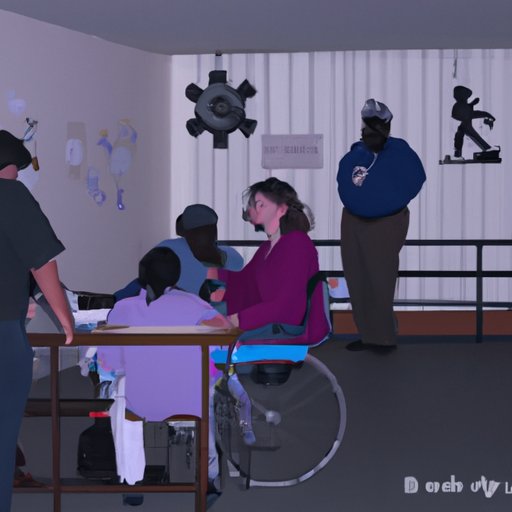
Introduction
Mental health illnesses have become increasingly popular and much more understood in recent years. In the United States, over 44 million adults experience some form of mental illness. Out of these, around 27% experience severe impairments which could affect their ability to work and maintain stability in their lives. Fortunately, there are disability benefits available for those who are suffering from mental illnesses. In this article, we explore what mental illnesses qualify for disability benefits, criteria for disability, and ways to navigate the current system.
Defining Mental Illnesses and Disabilities
A mental illness is a condition that affects one’s thinking, emotions, and behaviors. It can lead to distress and/or difficulties in functioning on a daily basis, making it a form of disability. The National Council of Mental Health estimates that 1 in 5 American adults experiences a mental illness in any given year. There are different levels of severity within mental disorders which can impact a person’s daily life in many ways. These disorders include anxiety disorders, depressive disorders, bipolar disorders, post-traumatic stress disorders, obsessive-compulsive and related disorders, schizophrenia and psychotic disorders, and intellectual disabilities.
Criteria for Disability Benefits
In order to qualify for disability benefits, one must prove they are unable to perform Substantial Gainful Activity (SGA) of any kind for at least a year due to their disability. The Social Security Administration (SSA) uses multiple criterion to determine if an individual qualifies for benefits. They rely heavily on medical records and may ask for additional consultations from doctors or psychologists.
The SSA uses a three-step process to determine if an individual qualifies for benefits. The first step is to determine if the applicant is working at the SGA level. Second, the administration checks if the mental illness qualifies for listing in their impairment manual. Lastly, if the mental illness does not qualify under the listing of impairments, the administration will examine if the applicant can still work. This final examine considers the applicant’s Residual Functional Capacity (RFC) and may allow them to do light work if it deems them able.
Impact of Mental Illness on Job Performance and Quality of Life
Mental illnesses such as bipolar disorder, depression, and anxiety disorders can impact an individual’s work performance as well as their quality of life. Day-to-day tasks can feel overwhelming and struggling to maintain concentration can cause problems on the job. According to a 2018 report from the National Institute of Mental Health, 7.9 million adults in the US experienced a major depressive event which represented 3.2% of the adult population. This resulted in 11.6% of the American workforce feeling limited in their ability to meet work demands due to the effects of their depression. This speaks to a need for disability benefits that can help support individuals struggling with their mental health.
Advocacy for Changes in Disability System
Mental health advocates are pushing for widespread changes to the current disability system. This includes fighting to expand mental health resources and recognition so that those who with mental illness can receive better treatment and assistance. They also advocate for updates to the system, questioning whether there are more fair ways of evaluating those who apply for disability benefits. There is also a push for dialogue in recognizing the human cost of mental illness and how it affects different groups such as veterans or young adults.
Navigating the Process of Applying for Disability Benefits
Applying for disability benefits can be a personalized process that involves patience, determination, and sometimes legal support. The disability application process can be daunting and complicated. There are many resources online and locally that aim to support those with mental health illnesses. This includes a variety of mental health organizations that advocate for support, awareness and change including but not limited to Mental Health America and the National Alliance on Mental Illness. Legal counsel services like Disability Rights are also available to support the filing process, appeals or reviews.
Analyzing the Current Criteria for Disability Benefits
Experts agree that some people suffering from mental illness are being denied benefits that they truly need. Oftentimes, those who have the same mental illnesses are treated differently or given unequal opportunity to win their disability claims. The current disability criteria may be too conservative in recognizing individuals with mental health conditions. Researchers suggest that SSA needs to improve their evaluations of listed impairments so that individuals with mental health illnesses can get better access to disability benefits. Despite this, disability benefits play a critical role in funding critical medical care for mental healthcare and affording a better quality of life for individuals living with mental illness.
Conclusion
The current system for disability benefits is, by many accounts, inadequate for those experiencing different levels or severity of mental illness impacting their daily lives. We’ve outlined important information on what mental illnesses qualify for disability benefits, the different criteria for disability, medical evaluations used to determine if someone is eligible, and some of the potential barriers in the disability system as well as ways to navigate the system. Mental health advocates are working to improve the current criterion for disability benefits, employers are becoming more aware of how they can support employees with mental health issues, and the general public has become more educated and empathetic towards those with mental illness. There is still much work to be done, and further improvements can lead to better quality of life for those in need. We each have an important role to play in addressing the mental health crisis in our communities by learning more about mental illness, advocating for changes, and showing support for those dealing with mental illness day-to-day.





